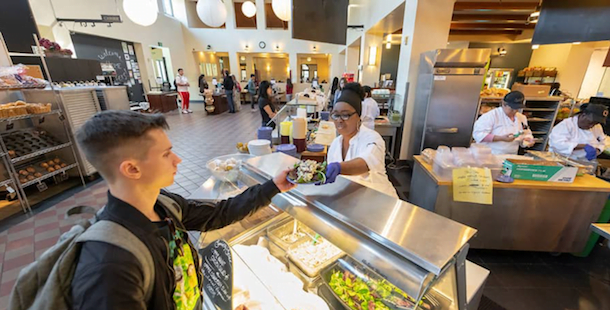
Rising costs are putting the pinch on consumers across the country, and the story's no different for campus dining. But the issue is dual-sided with both students and university dining services dealing with their respective challenges.
An editorial in The McGill Tribune is suggesting that rising costs of consumer goods, driven by inflation, has made dining at some on-campus locations cost prohibitive.
The write up states that the price of McGill’s mandatory meal plan has increased by 35.5% over the last five years. Now with the added stress of inflation, some students are feeling an extra pinch when purchasing meals at on-campus dining locations.
McGill’s meal plan costs $6,200 per year and comes with $500 in declining balance funds on the student oneCard. The meal plan is mandatory for all first-year students living in campus residences.
In an email to the McGill Tribune, the university's media relations officer noted that in order to keep up with the effects of rapid inflation, McGill’s food and dining services must operate the same way as any other retail operation.
A statement from McGill university media relations reads, in part:
“McGill Food and Dining Services is a self-financing unit with the mandate to break even at the end of the fiscal year. In addition, it is a mixed model, which means that they run self-operated units as well as units managed by a food provider and as well, some of the retail locations are run by tenants.”
The rising campus dining price at McGill and other universities brings with it a host of concerns for student dining habits, including choosing cheaper, less nutritious options or skipping meals altogether to avoid spending over the odds and stretch their meal plan further.
At Texas State University, the challenge posed by inflation from the dining services perspective is the need to feed a large population amid rising costs.
As reported by The University Star, this fall saw more Texas State freshmen in dining halls than ever before after the university recorded its largest freshman class to date. Serving this larger group has put new pressure on the dining halls.
Similar to McGill, Texas State places requirements on its freshmen, including having to live on campus. Texas State freshmen living on campus are also required to purchase a meal plan that can be used at two dining halls on campus and various on-campus dining locations.
Rising inflation has placed a premium on buying food for Texas State dining.
“Almost every week food and paper prices increases,” said Chin-Hong Chua, resident district manager of Chartwells at Texas State, in a statement to The University Star. “With a lot of shortages, this can cause us to have to settle for different food. Sometimes we are sent chicken tenders instead of chicken breast or foam plates instead of paper, and despite the fact that we don’t normally use these products, we have to adapt to these changes.”
Chua says the budget for the amount of food purchased increases by 20% year on year, but with inflation increased by 8.2% this past September, that 20% increase could become more restrictive for both the amount and quality of food purchased.
“We have to consider inflation when buying food,” Chua said. “We have to account for how the food will be consumed and buy the amount that causes the least waste.”




